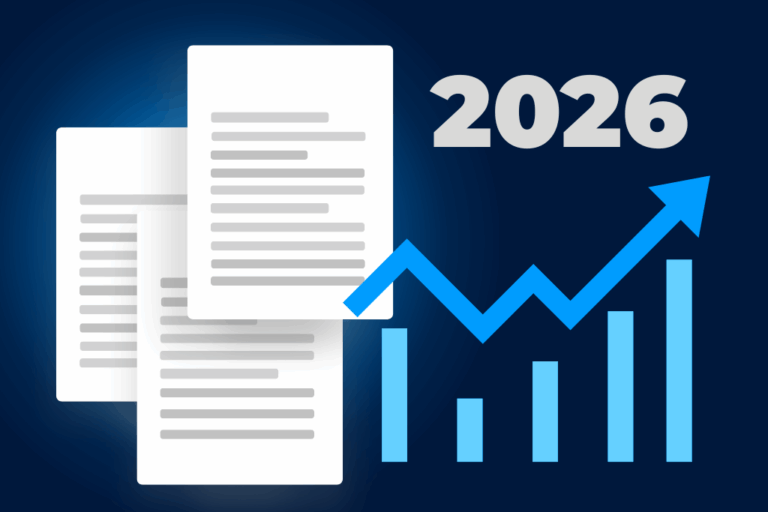With the proliferation of legaltechs in recent years, the digitalization of the legal sector has become a key concern for professionals. As numerous as they are promising, these digital solutions nevertheless raise a number of questions. The diversity of the products and technologies on offer makes the subject a complex one.
Robots, artificial intelligence, algorithms, data, dematerialization… all terms that are both fascinating and difficult to grasp, particularly when applied to a raw material as sensitive as contracts. To get a clearer picture, we’d like to take a look at what this digital wave is all about: what are the risks and benefits of automating your contract management? Find out in this article.
The challenges of contract management
Let’s start by setting the context for these new technologies. Every contract has a lifecycle, from drafting through negotiation, validation and implementation, to expiry. Successful management of these contracts means mastering every stage of the process, both in terms of the commitments made by the company and the regulations in force.
Volumes that are difficult to handle manually
As the volume of documents increases, so does the complexity of tracking contracts, with an average of 20,000 to 40,000 contracts per Fortune 1000 company(1). Managing such large volumes is all the more time-consuming and risky when the process is manual. For example, 52% of companies don’t know the expiry date of their contracts(2) : this exposes them to the danger of automatic renewals of unsatisfactory contracts. Another interesting figure is that around 15% of contracts are lost(3), resulting in a loss of information and therefore of risk control, which can prove costly for the company.
Complex collaborative processes
Managing a contract involves a number of different teams working alongside the legal department. The challenge here is twofold: firstly, to get operational teams to adopt good contract management practices, given that one out of every two operational staff(2) has not received any legal training on the main contractual clauses.
It is also a question of successfully exchanging information between the legal department and operational teams in a context of increasing turnover: the person present at the start of the project is not necessarily the person present at the end. Once again, this handover can lead to a loss of information and control over the commitments made.
Ensuring regulatory compliance
To make matters worse, on average, a regulation changes every 10 minutes worldwide(4). The consequences? Hours of research into contracts to identify the clauses concerned and ensure compliance. For the company, it also means the risk of seeing the contract end in litigation.
To overcome these difficulties, professionals are relying more and more on technology.
Automation in the legal sector
Imagine a cupboard full of contracts. You may have scanned these contracts. If so, they’re available on your computer in pdf format. Perhaps you’ve even used a simple office software program such as Word to draft them and share your comments by email with your collaborators. Perhaps you’ve also used Excel to collect data specific to these contracts and quantify them for later analysis… These are the beginnings of the digitalization of the legal sector. But these tools, while still very useful, have their limits. That’s where automation comes in.
What is contract automation?
Automation is the total or partial execution of technical tasks by machines operating without human intervention.
In contract management, this means entrusting the machine with certain tasks, such as :
- time-consuming data entry and retrieval,
- or streamlining the pre-signature approval process (no more back-and-forth emails with your colleagues, and no more paper initials riddled with annotations),
- or the creation of reminders to make sure you don’t miss any deadlines (a critical subject).
The example of Artificial Intelligence: from management to contract analysis
Beyond traditional management tools, artificial intelligence facilitates contract analysis. It turns your contracts into a database in its own right.
What does this mean? AI is able to retrieve important information directly from documents, and even identify contract types. From then on, all this data is available to the legal expert, who can handle and analyze it easily, without wasting time listing it. What’s more, as the data evolves with your contracts, this system ensures that you always have access to an up-to-date database.
What’s next? Intelligent search functions (to find any type of contract, clause or information instantly), statistical dashboards (to aid decision-making) and summary sheets for each contract (to identify key information at a glance)… these are just some of the features that will help you get the most out of your contract database.
→ Read also: Ensuring sustainable governance in the age of AI.
The benefits of contract management automation?
According to a study by the Cercle Montesquieu, the main benefits expected by legal departments from digitizing their activities are efficiency and work organization. The emphasis is therefore on improving performance and simplifying day-to-day tasks. In terms of contracts, automation makes it possible to :
#1 Managing your contractual commitments
Automation gives you greater visibility of the information contained in your contracts, thanks to automatic identification of key data (such as document type, clauses, dates, amounts, parties, etc.). You can more easily identify hidden risks and opportunities in your contracts.
Automation also translates this data into usable statistics, useful for decision-making. From now on, you’ll have your own KPIs, as well as visibility on the type and evolution of your contracts!
Automation also means sending reminder notifications, so you never miss a deadline again. Tacit renewals no longer escape your notice.
#2 Save time reviewing and analyzing contracts
Automation saves you hours of manual research and data entry. Instead of wasting time on tedious, non-value-added tasks, you can concentrate on your core business and make the most of your expertise.
Automation also speeds up pre-signature approval processes. Add an electronic signature overlay, and you can shorten the time it takes to sign an agreement. This means fewer lost opportunities, and fewer operational staff coming and going from your office…
#3 Simplify organization and optimize collaboration around contracts
By centralizing your documents, you have a common base where it’s easy to find and share them. No more bulky contract cabinets!
Tools such as the shared clausier or contract templates also enable you to share contractual knowledge and best practices internally.
#4 Modernize the image of the legal function
In recent years, legal departments have radically transformed their image as modern business players, using new technologies and making a real impact on the company’s business activities.
Take advantage of this opportunity to raise your profile internally: using your new KPIs, you can not only report more effectively to your superiors, but also give other teams a clearer picture of your added value to the company. Don’t hesitate to talk about artificial intelligence – if you have it – to reinforce your image as an “augmented lawyer”!
Would you like to find out more about automation in contract management?
Automation and legal functions: what are the risks?
While the benefits of automation are now well established, there are still a few questions about its impact and implementation. But don’t worry, we’ve answered them all here.
Replacing humans?
No way! While new technologies are sometimes perceived as a threat to jobs, the approach of legaltechs is quite different. These solutions are there “to augment man, not to replace him”, declares Alexandre Grux, CTO at DiliTrust. Indeed, no technology can replace a lawyer’s professional expertise. Technologies are complementary tools designed to relieve professionals of tedious tasks, far removed from their original motivations when they were studying law…
Trusting digital tools?
Automation has long been used in many sectors, such as marketing and sales, and has proved its worth as a reliable solution. That’s not to say it’s infallible, however, as it reduces the margin of error associated with manual processing. Humans lose their footing when there’s a lot of data and tasks become too repetitive. They lose their vigilance, and the risk of error becomes very high. Legal work is full of small tasks that require perfect precision to avoid copying and pasting too much or forgetting a key piece of information”, according to Alexandre Grux. The machine can reproduce millions of tasks without error, without fatigue and in just a few minutes. And if doubt persists, you can rest assured that humans will always have the last word: at DiliTrust, for example, AI systematically places the user in a position of control, by submitting for validation the information it identifies in contracts.
Is setting up a legaltech complex?
Online solutions (SaaS) are quick to set up, as there are no technical prerequisites. All you need is a login and password to connect to the tool. Generally intuitive and ergonomic, the interfaces are designed to optimize the user experience and enable rapid internal adoption. However, any digitalization project needs to be properly prepared: use cases, contracts to be imported, compatibility with other company software… these are just some of the questions to ask when choosing your legaltech.
Will technology change my habits?
Yes, of course. But in a positive way, by facilitating and enhancing your daily work. Technologies are not designed to dictate your uses, but to assist you. The transition must be gradual.
Remember that behind software, there are people. Legaltechs are always on the lookout for your feedback, to ensure that their tools are constantly evolving to offer you the best possible services – in a fast-paced world, this is a crucial issue for them! Their teams are there to support you in your digital transformation: advice, tutorials, feedback, demonstrations, support, hands-on experience… you can count on their know-how and attentiveness to help you make the most of your digital tools.
What about the security of my data?
Dematerializing contracts does not necessarily mean losing security. On the contrary, the protection of contractual data is a top priority for legaltechs. Security and confidentiality standards exist. Storage, encryption, hosting, availability, vigilance… talk directly to your legaltech!
Software, yes, but at what cost?
Budget is undoubtedly one of the biggest obstacles to legal digitalization projects. However, legaltechs offer a good compromise between the much higher financial cost of an external service provider and the time it would take to carry out the various tasks in-house, so we’re talking more in terms of a cost/benefit ratio and therefore an investment. Consider also the risks of unwanted renewals or missed opportunities, which weigh heavily on the company’s budget. Well-used technological support can help you avoid these, and enable you to participate in your company’s growth.
3 KEY FIGURES ILLUSTRATE THE COSTS ASSOCIATED WITH UNCONTROLLED CONTRACT MANAGEMENT:
- Companies lose $100 billion a year through poorly managed contracts(3)
- Processing and reviewing a standard contract costs an average of $6,900(5)
- 10% is the average loss in sales that can result from poor contract management(6).
Don’t hesitate to put these arguments to your superiors if you’re planning a digitalization project!
To find out more, download our white paper “How to choose your LegalTech solution: essential criteria and expert advice“.


